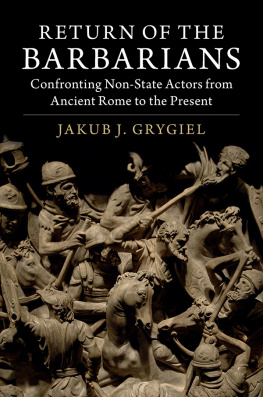Barbarians are back. These small, highly mobile, and stateless groups are no longer confined to the pages of history; they are a contemporary reality in groups such as the Taliban, Al-Qaeda, and ISIL. Return of the Barbarians reexamines the threat of violent non-state actors throughout history, revealing key lessons that are applicable today. From the Roman Empire and its barbarian challenge on the Danube and Rhine, Russia and the steppes to the nineteenth-century Comanches, Jakub J. Grygiel shows how these groups have presented peculiar, long-term problems that could rarely be solved with a finite war or clearly demarcated diplomacy. To succeed and survive, states were often forced to alter their own internal structure, giving greater power and responsibility to the communities most directly affected by the barbarian menace. Understanding the barbarian challenge, and strategies employed to confront it, offers new insights into the contemporary security threats facing the Western world.
Jakub J. Grygiel was a senior fellow at the Center for European Policy Analysis (Washington, DC) and an associate professor at the Paul H. Nitze School of Advanced International Studies of The Johns Hopkins University (Washington, DC). He is currently serving on the policy planning staff at the US Department of State.
Jakub J. Grygiel
University Printing House, Cambridge CB2 8BS, United Kingdom
One Liberty Plaza, 20th Floor, New York, NY 10006, USA
477 Williamstown Road, Port Melbourne, VIC 3207, Australia
314321, 3rd Floor, Plot 3, Splendor Forum, Jasola District Centre, New Delhi 110025, India
79 Anson Road, #0604/06, Singapore 079906
Cambridge University Press is part of the University of Cambridge.
It furthers the Universitys mission by disseminating knowledge in the pursuit of education, learning, and research at the highest international levels of excellence.
www.cambridge.org
Information on this title: www.cambridge.org/9781107158573
DOI: 10.1017/9781316665909
Jakub J. Grygiel 2018
This publication is in copyright. Subject to statutory exception and to the provisions of relevant collective licensing agreements, no reproduction of any part may take place without the written permission of Cambridge University Press.
First published 2018
Printed in the United Kingdom by Clays, St Ives plc
A catalogue record for this publication is available from the British Library.
ISBN 978-1-107-15857-3 Hardback
ISBN 978-1-316-61124-1 Paperback
Cambridge University Press has no responsibility for the persistence or accuracy of URLs for external or third-party internet websites referred to in this publication and does not guarantee that any content on such websites is, or will remain, accurate or appropriate.
To Tobias, Nina, and Sybil
Acknowledgments
This book took many years to complete. Consequently, the list of individuals who have made comments, observations, and critiques or who simply listened with great patience to various snippets of this topic is long. The germ of the idea began with a presentation at a small seminar hosted by the late Dr. Zbigniew Brzezinski. It then turned into a short essay, encouraged and chiseled by Adam Garfinkle, the editor of The American Interest , who was present at that seminar. From then on, several small or large aspects of the argument in this book have appeared in Orbis, Security Studies, Policy Review, Infinity Journal, and, again, The American Interest . I am grateful to the editors, the anonymous reviewers, and the readers who commented on these pieces. I have also presented parts of these arguments in many places (Princeton, Johns Hopkins, Naval Postgraduate School, Foreign Policy Research Institute, and the SGRI meeting in Trento, among others) and benefited from the discussions and the criticism offered at these events. The list of people to thank would be too long here.
I wrote the original draft while on the faculty at the Paul H. Nitze School of Advanced International Studies of The Johns Hopkins University. I benefited there from my frequent interactions with some great colleagues, in particular Charles Doran, Eliot Cohen, Riordan Roett, Marco Cesa, and Daniel Markey. My fabulous assistant, Starline Lee, helped with the daily tasks with great cheer. The SAIS librarians Sheila Thalhimer, Susan High, Stephen Sears, and others fulfilled every request I sent their way, giving me access to otherwise difficult-to-find books and articles.
I put the finishing touches on the manuscript as a senior fellow at the Center for European Policy Analysis. Conversations with its then president, Wess Mitchell, strengthened several arguments in this book not to mention that they also led to another book we coauthored in the meantime. Larry Hirsch supported me for years, and my stay at CEPA would not have been possible without him. The rest of the cheerful CEPA team were supportive in all my other tasks, allowing me to find time to edit the book, and are an incredibly friendly bunch.
Several research assistants helped me throughout the years on a variety of topics and among them are Philip Reiner, Carsten Schmiedl, and Alexander Bellah. Dianne Sehler from the Bradley Foundation, and Nadia Schadlow and Marin Strmecki from the Smith Richardson Foundation supported various projects that, while not directly related to this book, touched upon themes that make an appearance in it. Dr. Schadlow, in particular, has always been a font of encouragement and has often commented on early drafts of several of my writings.
Michael Watson at Cambridge University Press patiently combed through the manuscript, and even more patiently waited for my ruminations and final edits. Lisa Carter has helped with the preparation and publicity of the book.
Last but obviously not least, my wife and kids have kept me busy, stepping over the piles of books on barbarians strewn on my floor. The children have been lobbying, individually of course, to have the book dedicated to them. As always, they win, even though they will have to share the dedication with each other.
Introduction
Barbarians are back. Small groups, even individuals, administering little or no territory, with minimal resources but with a long reach, are unfortunately on the front pages of newspapers because of their destructive fury. They harass and attack states from the streets of London, Paris, and Barcelona to wider areas in the Middle East and elsewhere. They are not merely tragic and bloody nuisances but strategic actors that compete with existing states, forcing them to alter their behavior, their military postures, and even their domestic lifestyles. The various Islamist groups and individuals who over the past decade have presented in different ways a persistent threat to the United States and the West, as well as to states in other regions of the world, come immediately to mind. It would be certainly wrong to ignore the religious connotations of these groups, arising from the Islamic world, but it is equally dangerous to think that the conditions that are making these murderous groups possible are rooted exclusively in Islam. Barbarians are back because there are deep trends that bestow lethality, and thus a strategic role, to groups that do not need the vast administrative apparatus, the territory, and the skilled and rule-abiding citizenry of modern states.












